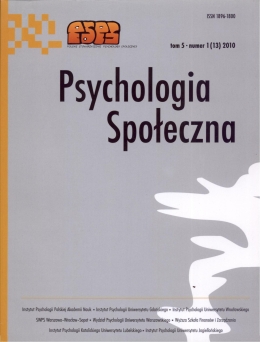Osobowość makiaweliczna i jej czynniki w porównaniach międzypłciowych: znaczenie inteligencji emocjonalnej i lęku
Machiavellian personality and its factors in gender comparisons: The role of emotional intelligence and anxiety
Author(s): Anna Siwy-Hudowska, Anna Kieszkowska-GrudnySubject(s): Psychology
Published by: Wydawnictwo Naukowe Scholar Sp. z o.o.
Keywords: Machiavellianism; anxiety as a trait; emotional intelligence; gender-differences
Summary/Abstract: Machiavellianism (Mach), is a set of traits expressed through lack of empathy, lack of concern for others, instrumental use of others, and doubtful morality. Emotional Intelligence (EI) is the ability to understand, control and manage own emotions, to self-motivate, and to be endowed with empathy and social skills. Anxiety is a psychological state associated with sense of threat, when one cannot identify its tangible source.The goal of the study was to test the hypothesis predicting gender differences in the level of Mach and its factors such as cynicism, flattery, immorality, and fraud. The additional purpose was to check the role of emotional intelligence and anxiety as a trait in individual differences in Machiavellianism. The study included 114 men and 137 women aged 18- 69. MACH IV scale, questionnaire for emotional intelligence and the STAI questionnaire were used. The study confirmed previous findings that Machiavellianism is higher in males that in women (total scale and subscales, except subscale flattery). High level of Machiavellianism was associated with low level of emotional intelligence and high level of anxiety. High level of cynicism, flattery, and immorality were accompanied by the low level of management of emotions.. A set of interactions between gender and EI factors revealed that cynicism was higher in men than women, if they also had a low self-motivation and empathy; and immorality was higher in men than women, if they had high interpersonal skills. Anxiety, irrespective of gender, was positively associated with all factors of Machiavellianism.
Journal: Psychologia Społeczna
- Issue Year: V/2010
- Issue No: 13
- Page Range: 27-41
- Page Count: 15
- Language: Polish

